Google’s search engine has traveled a long way from its early days, constantly changing and growing to bring you the freshest and most spot-on answers. With the introduction of generative AI, Google is revolutionizing the way we search for information online. As a result, marketers have come increasingly focused on understanding Google’s advancements as a means of developing SEO strategies for generative AI search.
By harnessing the power of AI advancements, Google is transforming the search experience, making it more intuitive, personalized, and efficient. The integration of generative AI into Google search marks a significant milestone in the company’s journey towards delivering a more intelligent and user-friendly search engine.

As Google continues to push the boundaries of what’s possible with AI-powered search, users can expect a more seamless and engaging search experience that caters to their unique needs and preferences. Meanwhile, for marketers, it is critical to understand these shifts to develop complimenting SEO strategies.
Understanding Google’s Generative AI Search
Generative AI search has truly transformed how Google operates, making it a breeze for the engine to grasp what we’re asking and hit us back with answers in a way that feels like chatting with an old friend. By leveraging machine learning algorithms and vast amounts of data, generative AI can provide users with more accurate and relevant search results.
Google’s AI-powered search engine can now understand the context and intent behind user queries, delivering results that are tailored to their specific needs. This level of personalization is made possible by the integration of generative AI models that can analyze and interpret large volumes of data in real-time.
Revolutionizing Information Organization with AI
Generative AI search is not only improving the quality of search results but also changing the way information is structured and presented on the web. With the help of AI, Google can now organize and categorize information in a more intuitive and user-friendly manner.
By leveraging the power of generative AI, Google can create rich snippets, knowledge panels, and other visual elements that make it easier for users to find the information they’re looking for. This not only enhances the user experience but also helps to improve the visibility of websites in organic search results.
The Impact of Lens on Visual SEO Strategies for Generative AI Search
Google Lens, a visual search tool powered by AI, has seen a significant increase in usage over the past two years. According to Google, people now use Lens for a staggering 12 billion visual searches per month, a four-fold increase from just two years ago.
This surge in visual searches highlights the growing importance of AI-powered tools like Google Lens in the search landscape. As more users turn to visual search to find information, businesses need to optimize their content for visual search to stay ahead of the curve.
From the perspective of SEO strategies for generative AI search – businesses can tackle the rise of visual search by optimizing content in a few important ways:
•Image Optimization: This is the key. Ensure high-quality, relevant images are used throughout your webpages. Focus on descriptive file names, alt text captions, and titles that accurately reflect the image content and incorporate relevant keywords.
•Multiple Image Angles: Don’t limit yourself to a single product image. Showcase your products from various angles to cater to users searching from different visual perspectives.
•Image Technicalities: Technical SEO for images is crucial. Use the right file formats (like JPEG for photos, PNG for graphics) and compress images to ensure fast loading times, especially for mobile users. Consider tools that can help with this.
•Structured Data Markup: Leverage schema markup to provide search engines with even richer context about your images. This can significantly improve how your visual content is understood and ranked.
•Image Sitemaps: An image sitemap helps search engines discover and index your image content more effectively.
By implementing these strategies, businesses can ensure their visual content is discoverable through visual search engines, keeping them ahead of the curve in the evolving search landscape.
Key Takeaway:
Google’s search evolution, powered by generative AI, is making searches more intuitive and personalized. By understanding user intent, Google delivers spot-on results fast. Plus, visual searches are skyrocketing with tools like Google Lens. Time to optimize for the future.
Multimodal Searches: A Growing Trend
Every day, it seems like Google’s search engine is learning new tricks, becoming even more helpful and adaptable than the day before. A growing number of searches are now multimodal, combining images and text to deliver more accurate and relevant results.
This trend is powered by advancements in large language models and foundation models. These AI breakthroughs allow Google to understand the context and meaning behind both visual and textual queries, making searches more intuitive and user-friendly.
For multimodal searches, having a comprehensive content plan is one of the key SEO strategies for generative AI search:
•Focus on Rich Content: Here again, its critical to move beyond just text. Create a variety of content formats including high-quality images, informative videos, and engaging infographics to cater to users searching with a combination of text and visuals.
•Optimize for Knowledge Graph: The Knowledge Graph is how Google connects related information entities. Use schema markup to help Google understand the connections between your text and visual content, making it more discoverable in multimodal searches.
•Target Long-Tail Keywords with Visual Elements: People using multimodal search are likely to use more specific queries that include descriptions of visuals. Research and target these long-tail keywords that combine text and visual elements relevant to your product or service. Answer The Public is a valuable tool for identifying relevant long tail keywords.
The Role of Vertex AI and Gemini Pro in Enhancing Search
The Vertex AI Impact on SEO Strategies for Generative AI Search
Vertex AI, Google Cloud’s unified platform for AI development, plays a significant role in enhancing Google’s search functionalities. By leveraging Vertex AI’s advanced tools and AI capabilities, Google has built more sophisticated models that understand user intent to deliver highly relevant search results.
From natural language processing to computer vision, Vertex AI empowers Google’s search engine to tackle complex queries and provide users with the more intuitive search results. In other words, through generative AI, search engine results are expected to really anticipate what the consumer needs, not just what they appear to be searching for.
Building a generative AI SEO strategy around this development means replicating it by focusing on understanding user intent:
•Go Beyond Keywords: Vertex AI suggests a shift from just keyword stuffing to understanding user intent. Analyze user search queries to understand the underlying needs and goals behind them. This will help create content that directly addresses those needs.
•Think Topic Clusters: Create content clusters that explore a central theme from various angles. This caters to users who might start with a broad search and then delve deeper with more specific queries using Vertex AI’s ability to understand context.
Key Takeaway:
Google’s search is getting smarter with multimodal searches, blending images and text for spot-on results. With Vertex AI and Gemini Pro, Google nails complex queries by understanding your needs better. Developing SEO Strategies for Generative AI search begins with understanding these developments and replicating them for your brand.
Enhancing User Experience with Multisearch and Gemini Advanced
Google is taking search to the next level with the introduction of multisearch capabilities and Gemini Advanced. These upgrades are about to make consumer search experiences not only smoother but are intended to make the entire experience more enjoyable.
Multisearch allows you to combine images and text in a single query. Imagine being able to snap a photo of a mysterious rash and instantly get information on what it might be and how to treat it. That’s the power of multisearch in action.
And with Gemini Advanced, you can engage in natural conversations with the search engine to get the answers you need. No more sifting through pages of results – just ask Gemini and get a direct, tailored response.
As a result, SEO strategies for generative AI search will largely revolve around the upcoming search experience with multisearch capabilities & Gemini Advanced. Businesses can prepare by:
•Focus on Natural Language Understanding: With Gemini Advanced understanding natural language, optimize your content for how users might ask questions about your product or service.
•Create High-Quality Content: Gemini Advanced prioritizes valuable information. Ensure your content is informative, addresses user pain points, and provides clear solutions.
•Focus on User Experience: Design your website and content with a user-friendly experience in mind. This will make it easier for users to find the information they need through Gemini Advanced.
Key Takeaway:
Generative AI is changing the game in healthcare searches, making it easier for everyone to find complex medical info. Google’s new multisearch and Bard Advanced are boosting search experiences, dramatically impacting SEO strategies for generative AI search by blending images with text queries and enabling natural conversations for quick answers.
Ensuring High-Quality Web Content with Generative AI
As generative AI becomes more prevalent in content creation, Google is taking steps to ensure the quality of web content generated through its AI models. By adhering to key standards for responsible use, Google aims to maintain the integrity and reliability of the information available to users.
Google’s approach to ensuring high-quality web content involves a combination of responsible AI practices and rigorous testing. The company has established guidelines for the development and deployment of its AI models, focusing on transparency, fairness, and accountability.
At the heart of Google’s approach to AI, there’s a strong belief that humans should always be in the loop. While AI models can generate content quickly and efficiently, Google recognizes the importance of human review to ensure accuracy, relevance, and adherence to ethical principles.
In other words, while creating content will continue to be critical for Generative AI SEO, and Google is comfortable with the use of AI in content generation, it’s critical that content retains real human value. This means using AI to assist with content development rather than relying on AI to produce your content.
The Significance of Previous Searches in Personalizing Results
Google understands that every user’s search history is unique, and this data can be leveraged to personalize and improve the accuracy of future search results. By analyzing a user’s previous searches, Google can gain valuable insights into their interests, preferences, and information needs.
This personalization process allows Google to tailor search results to individual users, presenting them with the most relevant content based on their past interactions with the search engine. For example, if a user frequently searches for recipes, Google may prioritize food-related content in their future search results.
The use of previous search data also enables Google to anticipate a user’s needs and provide proactive suggestions. This can be seen in features like Google Autocomplete, which offers predictive search terms based on a user’s typing and search history, saving them time and effort in formulating their queries.
Here again, our SEO strategy for generative AI search mirrors Google’s focus on search personalization. In other words, it all comes down to having a strong understanding of the target audience. Some tactics include:
*Analyze Search Trends: Use tools like Google Trends to understand search queries related to your industry and location. Look for patterns and specific terms users are searching for to tailor your content accordingly.
•Customer Personas: Develop buyer personas that reflect your ideal customer and their search behavior. Analyze what questions they might have and what content would resonate with their interests.
•Content Targeting: Create targeted content that addresses the specific needs and interests of your audience segments. This will increase the chances of your content appearing in personalized search results.
By understanding user personalization and optimizing your content accordingly, businesses can increase their chances of reaching their target audience and achieving their generative AI SEO goals.
Key Takeaway:
Google’s using smart AI to keep web content top-notch, making sure all info is accurate and fair. They’re also stepping up their game with large language models to nail complex questions and personalizing your search results based on what you’ve looked for before.
Wrapping up
The landscape of search is undergoing a dramatic transformation fueled by generative AI. Google’s search engine is becoming more intuitive, personalized, and efficient, catering to users’ unique needs and preferences. Businesses that understand these advancements and adapt their SEO strategies for generative AI search accordingly will be well-positioned to thrive in this evolving environment.
By focusing on high-quality content, optimizing for user intent and multimodal searches, and embracing the power of natural language understanding tools like Gemini Advanced, businesses can ensure their websites are discoverable in the new era of AI-powered search. Remember, while AI can be a powerful tool, user value remains paramount. Leverage AI to assist your content creation, but ensure a human touch to maintain authenticity and trust. As Google continues to push the boundaries of search with generative AI, the future promises an even more seamless and intelligent search experience for users and a dynamic landscape filled with opportunities for SEO-savvy businesses.










